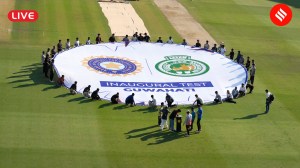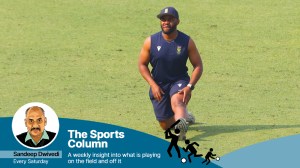Comrade Prakash Karat breaks his silence on Prakash Karat
CPM General Secretary Prakash Karat, who turns 60 today, talks about his life in a free-wheeling conversation...

CPM General Secretary Prakash Karat, who turns 60 today, talks about his life in a free-wheeling conversation with Malayala Manorama’s JOMY THOMAS — on his childhood, his motorbike, his interests, his initiation into politics and his marriage. “Sixty means I am a senior citizen. I don’t feel like a senior citizen,” he says.
Excerpts from the interview:
• On childhood
My father, Chundoli Padmanabhan Nair, was working as a clerk in Burma Railways. My mother’s (Elappully Karat Radhamma) family was also in Burma. They got married in Burma and I was born there in 1948. When I was six months old, my mother brought me to Kerala and we stayed in Palakkad for four and a half years. We went back when I was five and stayed there till I was nine.
I lost my sister there, she died of a sudden illness. Since my father’s job, then at Burma Oil Pipeline Project, took him to different places in Bihar and Bengal, my mother wanted me to be based in Madras for my studies. (I studied at the Madras Christian College School and Madras Christian College.)
After my father’s death (he died when I was 13), my mother became an LIC agent. She took a loan, built a house in Madras and gave it out on rent. We used to live in the outhouse and live on the rent.
After my BA, I got a scholarship to study at the Edinburgh University. By that time, I had become political… so the only way to avoid taking up a job was to go abroad for studies.
• Planned engineering, dropped it
Partly because I was the only child, I took to reading early. I was a very shy person in school.
Later in college, I made a lot of good friends (who are friends even now).
I used to read, I used to go alone to watch films, I used to have a cycle to go to my school. I would read all kinds of books. I was considered a good student in school, except in my last two years when I started developing interest outside studies. Before that, I used to win the general proficiency prize, the Bible prize, the scripture prize… everything. I used to read the Bible so well.
I would see all movies I could—Tamil, English and Hindi. Thyagarajan, the adopted son of M S Subbalakshmi, was a good friend of mine. I would spend a lot of time in Kalki Gardens where Sadasivam and MS had a beautiful home and a big garden. There I met all top artistes.
In 1964, when I finished high school, I won an all-India essay competition sponsored by The Hindu and a Japanese company and I was sent to Tokyo to see the Olympics. That’s when I realised that I could write something.
I was planning to join the engineering college in Madras. I had a teacher in pre-university who told me that I had a talent for writing. He was my English teacher, J Vasanthan. He lives in Madurai and I am still in touch with him. He advised me not to go for engineering. I would have ended up as an engineer.
I did not want to do (English) literature because I felt that economics was good.
Rev. Duncan Forester, my professor of political science at MCC, encouraged me to apply for a scholarship at Edinburgh, his university.
• Edinburgh and Marxism
I got a motorcycle in the second year in college. A Jawa. Since I was the only child, my mother had to given in to all my demands. I sold my motorcycle to pay the fare when I went to Edinburgh. I had to sell certain things—one motorcycle, then some shares somebody had invested for me. I also took an interest-free loan of Rs.10,000 from a trust which I repaid when I came back.
In Edinburgh, I became a full-time student activist. I used to work hard, six hours in the library, three-four hours for lectures etc.
When I went to Edinburgh, my thesis was on Indian languages and national politics. I could read about India and Marxism — my whole understanding developed which helped me to decide that I must join the CPI(M).
In 1969, I came to India for my field work for three months. Then I contacted the party in Madras. I went to the party office and offered to join the party, leave my studies and be a full-time worker. Party leaders advised me to finish the degree and come back.
(In Edinburgh, the person who embedded Marxism in me was Victor Kiernan, the Marxist historian. I used to attend his lectures. I spent time discussing things with him.)
When I came back in July 1970, I met the party leaders again.
They asked me whether I was interested in going to Delhi and working with AKG (A K Gopalan). I jumped at that opportunity. But I had to give a reason to my mother for leaving. So I applied to Jawaharlal Nehru University and got a scholarship to study there.
AKG had promised me that he would take me to Kerala. I wanted to go to Kerala and work with people. I said I don’t want to study any more. But (P) Sundaraiah decided that I should contest the elections in JNU.
• Contemporaries in Madras
I did not know (P) Chidambaram when I was in college. He was senior to me and a contemporary of N Ram (editor of The Hindu). Ram was a good cricketer, he used to play for the university and the state in the Ranji Trophy. I came to know him when I came back from Edinburgh. He had come back from Columbia after his journalism degree. I had read his thesis — he had written about the role of English in India. It was part of my thesis as well.
We had a small group in Madras who all had just come into the CPI(M) — Ram, Mythili Shivaraman — Chidambaram was part of their debating club and they started a magazine called Radical Review. His views changed . . .
• Brinda, marriage, Emergency
It was during Emergency that I got married. I met Brinda when she was working as a wholetimer in our People’s Democracy office in Calcutta. She wanted to come to Delhi to work and the party agreed.
I had known her in Calcutta, when I stayed at our SFI office headquarters. I used to stay in Biman Basu’s room¿ He used to sleep on the bed and I on the floor. It was a small room full of books. The window opened to the People’s Democracy office. I used to meet her there.
But I got to know her better when she came to Delhi. When we decided to get married, we thought we would wait for Emergency to get over. Comrade (HKS) Surjeet said, “Don’t wait for the Emergency to get over — We don’t know how long it would last.”
I had decided on the marriage. Then I asked permission from the party and my mother. And P Sundariah, who was important to both of us . . . he knew both of us well and approved. The date was fixed by Surjeet. He said it should be on November 7.
For a long time, nobody knew her in Delhi as Brinda . . . till 1980s she was known as Rita . . . (During Emergency ) I had a different name . . . my name was Sudheer. She was known as Rita in public; in my case, I used that name only for certain purposes.
My mother died during Emergency, after our marriage. After we got married, I shifted to a new house so she could live with us for four months. In some place near north Delhi, near Delhi University, I took a house posing as a lecturer.
There I said I was a JNU lecturer because I was living near the Delhi University.
My mother had sold the house in Madras before coming to Delhi. That money was invested and she had some income from that. What I had was what my mother had left me.
I wanted to give it to the party but the party decided that I should not take wages (from the party) and live on this income. Comrade Sundaraiah made a calculation and told me that it would be better and don’t take anything from the party. I had Rs 45,000 and some money Brinda had. He was very meticulous in these things. He used to take interest in every detail of your personal life.
• Hasn’t being Prakash Karat’s wife helped Brinda’s political career?
She became a party wholetimer in the same period as I did. We are more or less of the same age and our political careers have run parallel. Obviously, when you are married to a person and when both are political and both have a common ideological world, you help reinforce each other’s views and help each other. As much I have helped her in her development, she must have contributed to mine.
• Is she in the Politburo because of you?
I don’t think so. In our party, it’s the other way round. We generally are more careful not to promote our relatives.
• On being called the most powerful political leader, the govt’s remote-control
It’s all media hype. You will see all that when the budget is presented. You won’t see one word of what we demand there.
• On crime fiction
I read crime fiction because there is a type of crime fiction which is very sophisticated, it gives you an idea of the society where that crime is located. Inspector Cheng series (by Qui Xiaolong) gives you a good insight into what is contemporary China. From Henning Mankell’s books you get a good idea of issues in Sweden today. My favourite, of course, has been Ian Rankin who is from Edinburgh and also the top most crime fiction writer in Britain today. I have never been to America. You get a good idea of Los Angeles if you read Michael Connelly. He writes only about Los Angeles. They always write rooted in their milieu.
• What’s the secret of staying fit at sixty?
A daily, 45-minute walk. And he adds he is a non-vegetarian who does not eat meat. “In my wife’s state, Bengal, fish is considered a vegetarian item,” he says.
(Courtesy: Malayala Manorama)



- 01
- 02
- 03
- 04
- 05



























